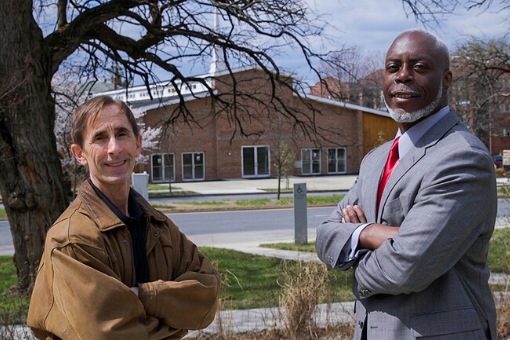July 2022
According to Pastor Franklin Lance, DMin, senior pastor at Mount Lebanon Baptist Church (MLBC), a sincere and authentic relationship between the University of Maryland School of Pharmacy’s (UMSOP) PATIENTS Program and MLBC allows them to serve and improve the health of the West Baltimore community the church calls home.

From left, C. Daniel Mullins and Pastor Franklin Lance
This trusted partnership is central to their latest collaboration, “COmmunity Mistrust and Measures of Institutional Trustworthiness (COMMIT).” Funded by the National Institutes of Health under the Rapid Acceleration of Diagnostics for Underserved Populations initiative, this $1.2 million grant will create a sustainable model for trustworthy community-engaged research partnerships and organize a set of best practices around them.
Daniel Mullins, PhD, professor in the Department of Pharmaceutical Health Services Research (PHSR) at UMSOP and executive director of the PATIENTS Program, and Joey Mattingly, PharmD, MBA, PhD, associate professor, PHSR, and the PATIENTS Program’s director of operations, serve as co-primary investigators (co-PIs) on the project. Mullins noted the COVID-19 pandemic has created challenges around health equity that could have been avoided with better community-academic partnerships.
“When we met with Mount Lebanon Baptist Church, we discussed how we can formalize our years-long joint commitment and use it as a template to assist other groups trying to start a community-academic partnership,” Mullins said.
Formalizing the Collaboration
For the past 10 years, MLBC and the PATIENTS Program have worked together to improve community health outcomes and give West Baltimore residents a seat at the health research table.
Community members have shared with the PATIENTS Program team their lived experiences on a host of health topics within research projects, including concerns about job insecurity and a lack of employment opportunities. Medical mistrust also is an ongoing issue, which stems from generations of untrustworthy research behavior.
COMMIT formalizes the partnership between research and the community with the development of a memorandum of commitment (MOC), which serves as a critical step in building trust between research and the community.
“The COMMIT project asks, ‘How can we put in writing the commitment between the two institutions?’ ” said Lance, who has worked on similar documents as president and CEO of Parks and People in Baltimore. “What we seek to do here is say, ‘This is not something we’re just talking about, but something we are willing to document that we will do. We believe so much in the work that we are willing to document it.’ ”
Turning the MOC into practice, MLBC is working with CVS Health to develop a workforce development center for a pharmacy technician training program that will operate out of MLBC’s lower level. The PATIENTS Program and UMSOP will leverage their longstanding partnerships with MLBC and CVS to conduct community-engaged research on social and behavioral indicators of health.
What the MOC Represents
Putting a promise and partnership in writing signifies respect of everyone’s time, efforts, and contributions. Too often, researchers design an entire study and just run it by the community.
“The PATIENTS Program doesn’t believe that such ‘rubber stamping’ builds trustworthiness or a mutual commitment,” Mullins said. “Mount Lebanon Baptist Church wasn’t just involved in developing the COMMIT proposal; Pastor Lance came up with the idea of the COMMIT project as well as the concept of the memorandum of commitment.”
Working collaboratively means community members are invested from the start in the research project. By taking part in writing the grant, finalizing the aims, and providing input on the budget, the community serves as a partner. The MOC is a critical component to help the community feel safe, respected, and informed when it comes to taking part in research and issues that affect their health.
“The community now has a tool they can use to hold people accountable,” said DeJuan Patterson, MPA, social impact consultant, advocate, and community partner on COMMIT. “To hold themselves accountable and hold their partners accountable for what they will do and what they have done in the past. To have people in the community be informed and empowered to make accurate decisions to improve their health outcomes for generations to come — that’s a longstanding benefit for the community.”
Patterson also cites the importance of not only establishing trust and credibility but also maintaining them. He says multiple generations in the community have feelings of medical mistrust from research.
“East and West Baltimore residents all have unique lived experiences with research institutions that did not end well,” Patterson said. “There’s a great deal of mistrust, and before we can even try to build trust, we have to level-set to establish trust. The COMMIT project is a step toward establishing that trust.”
Search UMB News
Sign up for UMB Alerts.



